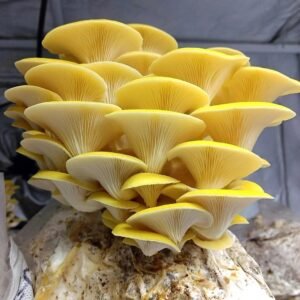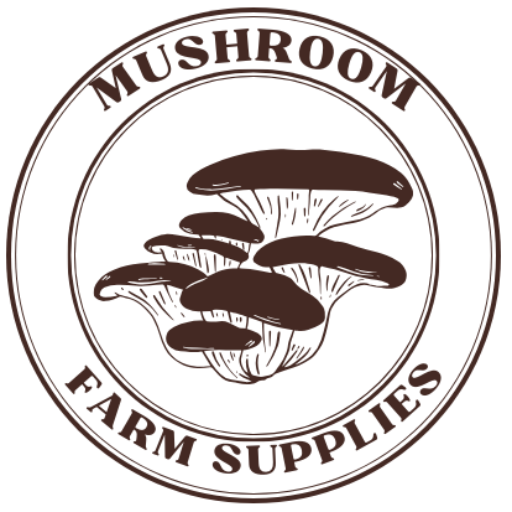Yellow Oyster Fruiting Conditions
Days To Colonize – 14-21 Days – Days To Fruit – 7-14days – Side Fruit In Bag
Yellow Oyster mushroom (Pleurotus citrinopileatus) requires the following conditions for optimal fruiting:
Temperature: Fruiting temperature range is between 59-77°F (15-25°C).
Humidity: Optimal relative humidity is between 85-90% during fruiting.
Carbon Dioxide (CO2): Normal atmospheric CO2 levels of 400-450 ppm are suitable for fruiting.
Fresh Air Exchange (FAE): A minimum of 1-2 exchanges of fresh air per hour is recommended during the fruiting phase.
Lighting: Yellow Oyster mushrooms do not have specific lighting requirements during fruiting. They can fruit successfully in environments with low light levels, including complete darkness. However, they can benefit from exposure to light, which can help regulate the length of the photoperiod. If using artificial light, a fluorescent bulb or LED grow light with a red/blue spectrum can be used to provide adequate light without creating too much heat or altering the temperature of the fruiting environment. Light levels can be kept low, around 20-50 lux, as long as the mushrooms receive enough FAE to maintain healthy growth.
Buy A Yellow Oyster Mushroom Grow Kit Today
Yellow Oyster Fruiting Temperature
The optimal fruiting temperature range for Yellow Oyster mushrooms (Pleurotus citrinopileatus) is between 59-77°F (15-25°C). This species is relatively tolerant to a range of temperatures, but it may slow down or stop fruiting at temperatures above 80°F (27°C). Maintaining the correct temperature range is important for optimal fruiting and to prevent the growth of unwanted mold or bacteria that can compete with the fungus for resources.
Check Out Our Yellow Oyster Mushroom Spawn
Yellow Oyster Fruiting Humidity
The optimal relative humidity for Yellow Oyster mushrooms (Pleurotus citrinopileatus) during fruiting is between 85-90%. High humidity is important for this species to maintain adequate moisture levels and prevent the formation of dry, inedible fruitbodies. Additionally, maintaining hig h humidity can also help prevent the growth of unwanted mold or bacteria that can compete with the fungus for resources. Good air exchange can help regulate humidity levels in the fruiting environment.
h humidity can also help prevent the growth of unwanted mold or bacteria that can compete with the fungus for resources. Good air exchange can help regulate humidity levels in the fruiting environment.
Try Our Yellow Oyster Mushroom Ready to Fruit Blocks Now!
Yellow Oyster Fruiting Fresh Air Exchange
Fresh Air Exchange (FAE) is important for Yellow Oyster mushrooms (Pleurotus citrinopileatus) during fruiting as it helps regulate humidity levels, prevent the buildup of harmful gases, and provide the fungus with adequate levels of oxygen for growth. A minimum of 1-2 exchanges of fresh air per hour is recommended during the fruiting phase. This can be achieved by using fans or other air exchange systems, or by simply opening the fruiting chamber to allow fresh air in and out. Over-exposure to fresh air can cause stress and slow down fruiting, so it is important to strike a balance between providing adequate FAE and avoiding drastic fluctuations in environmental conditions.
Yellow Oyster Fruiting Co2
Yellow Oyster mushrooms (Pleurotus citrinopileatus) do not have specific requirements for Carbon Dioxide (CO2) levels during fruiting. Normal atmospheric CO2 levels of 400-450 ppm are suitable for fruiting, and this species does not require additional CO2 supplementation. However, if fruiting in an enclosed environment, it is important to ensure that adequate fresh air exchange is provided to prevent the buildup of harmful gases, including CO2. Maintaining healthy air exchange can help regulate CO2 levels and provide the fungus with adequate levels of oxygen for growth.
Yellow Oyster mushrooms (Pleurotus citrinopileatus) do not have specific lighting requirements during fruiting and can fruit successfully in environments with low light levels, including complete darkness. However, they can benefit from exposure to light, which can help regulate the length of the photoperiod. If using artificial light, a fluorescent bulb or LED grow light with a red/blue spectrum can be used to provide adequate light without creating too much heat or altering the temperature of the fruiting environment. Light levels can be kept low, around 20-50 lux, as long as the mushrooms receive enough Fresh Air Exchange (FAE) to maintain healthy growth. Over-exposure to light can cause stress and slow down fruiting, so it is important to strike a balance between providing adequate light and avoiding drastic fluctuations in environmental conditions.
We Have Only The Best Yellow Oyster Fungus Mushroom Liquid Culture Available
